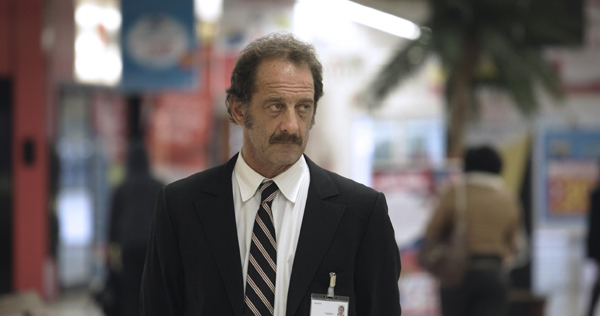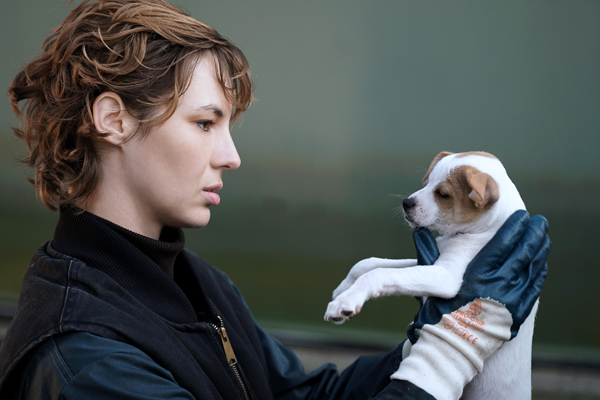French actors did very well at Cannes 2015, and it was definitely the year of Emmanuelle Bercot. Standing Tall, a drama she co-wrote and directed, opened the festival, and she went on to share the best actress award (in a tie with Carol’s Rooney Mara) for starring in fellow actress/director Maïwenn’s rowdy hothouse drama Mon Roi. Apart from Marion Cotillard’s co-starring role in Macbeth (as the instigator of regicide), Bercot had the richest part for an actress, at least in the official competition, thanks to her character’s contradictions and relentless emotional roller coaster ride.
Through two contrasting and intertwined time lines, Mon Roi dives into the destructive, physically abusive relationship between Bercot’s outwardly sophisticated thirtyish Tony and Georgio, a high-living restaurateur and all-out cad (a role made for Vincent Cassel), who’s well into middle age. We learn bit by bit of their history, from a meeting at a nightclub to Tony’s months-long stay at a rehabilitation center a decade later. There she gingerly learns to walk again after a skiing accident in the film’s most enigmatic subplot: Did Tony purposely lose control on the slopes?
The attraction between Tony and Georgio is undoubtedly sexual; there are plenty of ruffled bed sheets. Georgio takes his motto to heart: “I enjoy making people happy,” and how. (I did say this was a French film, right?) However, the couple’s pattern of behavior is rigidly set early on: the blindsided Tony’s volatile reactions to Georgio’s affairs, as well as to his indifference, addictions, cruelty, and his moodiness when he’s off Xanax. Her motivations for remaining in the marriage may be ambiguous, but the characterizations are oddly overwritten, even though the interactions are improvised based on Maïwenn’s plot outline.
Audiences will also grow frustrated as Georgio’s lies become more transparent, given that Tony is a high-powered attorney, handpicked for a nationally important case. Yet there is no evidence of her being able to dismantle an argument or to defend herself. We don’t convincingly see that side of her.
Despite the trouble in Tony’s short-lived paradise with Georgio, the film has a breezy feel, especially in the couple’s early halcyon days and when Toni reinvents herself in rehab, where she basks in the attention of much younger working-class mecs. It gives off a messy devil-may-care attitude because of the improvisation, although Tony and Georgio still feel defined by type.
The film runs 130 minutes, yet the pace never flags, with Bercot busy emoting, snogging, and breaking down for your attention. Directed to hang on to co-star Cassel’s every word, she doesn’t just laugh at his jokes—she nearly breaks into hysterics, as though straining to be the life of the party, and no gesture is too odd: when Tony first meets Georgio, she approaches him at a disco and splashes water in his face. The highs and lows of her behavior might be bipolar, but Tony’s overly exuberant mood swings are more likely the result of an actor overdoing it. Even Louis Garrel, often a cool slacker actor, is a bit of comic ham, as Toni’s confidant/brother. Like Bercot, he aims to entertain, less there’s a reflective moment. Still, Bercot is game, holding nothing back, and as Tony undergoes a tough rehab regiment, her performance centers on Tony’s physicality. These moments are the most psychologically convincing and coherent, a respite from the repetitive scenes of a mismatched marriage.
It was no surprise that Vincent Lindon won the best actor prize for The Measure of a Man. At its premiere, he received a five-minute standing ovation. Anyone who has been in touch with French films, even sporadically, will recognize Lindon, who has appeared in a variety of genres for many noted directors during the past 20 years or so, such as in Welcome and Augustine.
His director, Stéphane Brizé, takes a muted approach to a growing and revitalized genre: social-cum-morality dramas fraught with financial anxiety. It’s not that the kitchen sink drama has been necessarily reinvented, but it has become an effective arena to play out postrecession fears, and there has been a spate of these films recently—from Europe and America, as in the upcoming 99 Homes. If there’s any hope of bucking the trend of layoffs, foreclosures, or limited job prospects, it’s in the solidarity of others in the same boat.
This sense of helplessness begins in the first scene, when Thierry (Lindon), a laid-off blue-collar worker in his early fifties, is told he doesn’t have enough experience for a crane operator position—despite having spent four months in a training program. The otherwise soft-spoken man lets his anger loose on the job counselor, one of the few in which he looses his cool. Otherwise, the actor and the rest of the ensemble keep their emotions simmering.
While Thierry takes part in a self-help group, his pride plummets further. Participants are asked what sort of image Thierry projects. He’s told he looks “evasive” and that his speech is “limp,” and the dejection takes a toll on him physically: he slumps in his fold-out chair as though he really doesn’t want be there (who could blame him?), and his eyes dart here and there. His focus remains downward. At ballroom dance lessons with his wife, she has to work overtime, guiding him and working around his stiffness.
He won’t consider selling their home—it would negate all that he and his wife have worked for—nor will he sell their mobile home below what he feels is a fair price. Thierry and his wife have one child, a developmentally disabled teenager, Mathieu (Matthieu Schaller), a good student who wants to go on to college, though his grades have recently slumped. So after 20 months without work, Theirry accepts the sole job offer he receives: a lowly paid security guard at a humongous supermarket.
Through closed-circuit monitors and the 80 on-site cameras, he keeps an eye out for the usual suspects—shoplifters—but he’s also told by his supervisor to watch out for anything odd on the part of the cashiers; layoffs are impending and upper management needs ammunition. In other words, he’s to rat out his coworkers for infractions such as hoarding coupons or swiping the wrong loyalty card. (The French title translates, appropriately, as “Market Law,” a rare example where the English title is more direct and eloquent.)
The vérité influence of Jean-Pierre and Luc Dardenne is heavily felt in the long hand-held takes and especially in theme, considering that the Dardennes stole Measure‘s thunder. The working-class everyperson protagonist (played by Marion Cotillard) of their last film, Two Days, One Night, was trapped in a lose-lose position: to ask her colleagues to give up their bonuses in order to allow her to get back her old job. (Cotillard is everywhere, every year.) Her urgency coursed through the film, which featured a richer roster of supporting characters. Much of the cast of Measure is also made up of nonprofessional actors, though directed in an understated way so that no one stands out. In fact, the most dynamic incident occurs off screen; had it been shown, it would upturned Brizé’s reserved storytelling.
Though Measure is too restrained to become as memorable as Two Days, there are remarkable moments, fleeting and almost off the cuff, particularly one that reveals volumes about Thierry. Now that he has a steady paycheck coming in, he, his wife (who remains mostly in the background), and their son throw an impromptu post-dinner celebration, dancing around in the living room. Caught up in the moment, Mathieu grabs his dad’s arms and begins dancing one-on-one with his him, but just for a second. Thierry impulsively, though gently, steps back and directs Mathieu away from him and toward his mother. Even in his own home, he rigidly keeps his feelings under control.
In terms of drama, The Measure of a Man also had competition from first-timer Laurent Larivière’s I Am a Soldier, in the Un Certain Regard section. It takes a more hard-hitting approach. Drug dealing, human trafficking, and wildlife poaching have been stand-ins for the global black market economy in film. Larivière’s emotional hook, centered on an illegal puppy mill, is original and undeniably attention-getting. Yes, the camera adores the pups, some of which can barely walk, but he keeps them at arm’s length, not milking the built-in pathos. Still, you will certainly want to stay for the credits to make sure no animals were harmed.
This time, a young woman’s integrity is trampled upon. In short order, the screenplay dispatches with the setup: 30-year-old Sandrine is kicked out of her Paris apartment and has to wait three months to get her deposit, so she moves back to northern France to her single, cash-strapped mother (three other family members are also crammed into the quarters). Like Measure’s Thierry, she has no luck finding work, but her attitude is more bemused than baffled. When she is asked a loopy question at a job interview (what would she bring on a desert island?), Sandrine glibly answers, “A gift for man Friday.”
More out of necessity than family obligation, her Uncle Henri (Jean-Hugues Anglade), a self-described dog breeder, agrees to let her work at his kennel, spraying down the cages and feeding dozens of yapping dogs, all to be sold to local pet stores. First sign of trouble: one customer complains that he sold her a pooch with a skin infection. After Sandrine discovers a dead pup, her uncle gruffly tosses it into the garbage. The full extent of his business becomes clearer when she accompanies him across the border in Belgium to buy a crateful of dogs from Eastern Europe, before heading to a veterinarian who desultorily rubberstamps forged documentation in exchange for euros. Her uncle warns her, “Not a word to the family,” and Mom’s benevolent brother has turned into a one-note heavy.
The film’s title comes from the Johnny Hallyday version of the 1960s pop hit “Mr. Lonely” and provides a self-lacerating excuse for Sandrine: she’s just following orders. A somewhat complicated character, she chooses cash over consciousness—to a point. She saves a poodle marked for death and begins her own sideline, cutting deals behind her uncle’s back. As though to ease her mind, Sandrine overspends on luxury food items for a family feast, money that could have helped the family get out of debt, as her flabbergasted mom points out.
As she goes about her day, Sandrine assumes a detached posture, hiding behind her androgynous uniform of jeans and an oversize shirt. The low-key demeanor dulls the drama, and the willowy star, Louise Bourgoin (The Girl from Monaco), nevertheless looks like she could work the fashion runaway (see photo above) and is slumming it. (Really, no clothing outlet will hire Sandrine?)
The tone roams between social realism and the creepiness of a crime thriller, and something else—you won’t forget that this is a French film when the timid vet expresses his romantic feelings for Sandine: he waits for her in his office naked. (He figures that if he appears completely vulnerable that she’ll also lower her guard.) She answers the come-on with nervous laughter, and the nudity was greeted with a lot of giggles from the teens in the Cannes audience, too.
So far, only one of the three films above has an American distributor: Kino Lorber will release The Measure of a Man in 2016.



















Leave A Comment